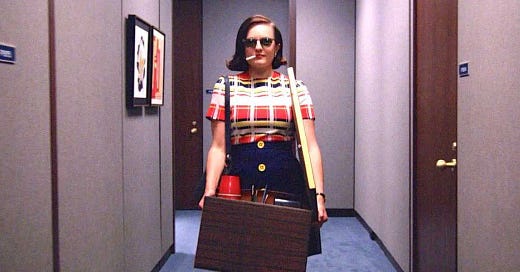Studio Apartment, Single Women Only
➕ A unique pair of WWII-era procedurals and the downfall of an art forger
Welcome to The Optionist. As always, thanks for reading along.
Well, Comic-Con is here again. Which means that while some of us are celebrating the arrival of Nerd Thanksgiving, others are bellyaching about what an overcrowded hellscape it’s become. I’ve always thought of myself as someone who had pretty solid geek bona fides. I started reading comic books when I was seven and I've contributed to several books about the history of Marvel. But then I went to San Diego and realized I was an amateur compared to the cosplaying hard-core faithful. Even though the annual confab isn’t quite as hot as it was during the height of the superhero-movie boom in the 2010s, I think everyone should go at least once, just to get a feel for the scene.
One event that I’ve never attended (and always wanted to) is the annual Scribe Awards put on by the International Association of Media Tie-in Writers (IAMTW). I’m not kidding! Yes, at first I thought I could get a laugh out of poking a little harmless fun at them. But over the years I've gained a lot of respect for tie-in writing, both creatively and as a business. Tie-in books are still a lucrative market. It was sort of like fan fiction before fan fiction was a thing. They also keep fans connected to a franchise in the fallow periods between movies/TV shows. The most obvious example is Star Wars. These tie-ins didn’t just sustain fandom, they deepened and extended it.
There are many established writers who moonlight as tie-in writers. Take the IAMTW's founders: Lee Goldberg's TV writing credits go more than 25 deep, including his role as an EP on Diagnosis: Murder for several seasons. Then there’s mystery/thriller writer Max Allan Collins, whose graphic series Road to Perdition was turned into the Tom Hanks movie of the same name.
The pay isn't great for tie-in work, the deadlines are usually intense (a few months to crank out an entire novel) and they deal with a bunch of different demanding chefs in their kitchen (don't include this, include that; that’s not what it looks like on screen). For novelizations, they often work with incomplete information — say, an early script that doesn't reflect what the final movie looks like — while also being asked to fill in the gaps between scenes. It's like constantly trying to thread a needle in a dark room.
The IAMTW gives out its annual awards at Comic-Con and brings together this niche industry's biggest names. They hand out trophies for everything from audio drama to original tie-in novel and also give out the Faust Award — a career achievement honor that allows you to call yourself “Grandmaster” for the year (which, let’s just admit, is a pretty frickin’ cool title to throw around). This year's winner is James Reasoner, the writer of 350 novels (mostly Westerns), including tie-ins for Deadwood, Lone Star and Walker, Texas Ranger.
Tie-in writers play a valuable role in the IP ecosystem, even if the idea of an Oscars for the profession makes me chuckle. Then again, maybe it's just the logo . . .
Onto this week’s picks, which include a 1960s female-centered ensemble drama and a wicked satire. The full lineup:
A satirical comedy about a mild-mannered man who is liberated by a genetic test revealing that he’s predisposed to crime
A historical drama set at a fictional version of the Barbizon in 1960s NYC
A period procedural centered on a Japanese American nurse solving crimes in the aftermath of internment
A true-crime grift about a skilled forger caught by an obsessive collector






